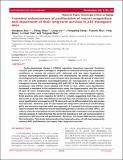Transient enhancement of proliferation of neural progenitors and impairment of their long-term survival in p25 transgenic mice
Author(s)
Zou, Donghua; Zhou, Yijing; Liu, Long; Dong, Fengping; Shu, Tianzhi; Zhou, Ying; Tsai, Li-Huei; Mao, Yingwei; ... Show more Show less
DownloadTsai_Transient enhancement.pdf (12.95Mb)
PUBLISHER_CC
Publisher with Creative Commons License
Creative Commons Attribution
Terms of use
Metadata
Show full item recordAbstract
Cyclin-dependent kinase 5 (CDK5) regulates important neuronal functions via p35. p35 undergoes cleavage in response to neuronal activity and neurotoxic conditions to release its subunit p25. Although p25 has been implicated in various neurodegenerative diseases, the mechanisms by which p25 mediates neurodegenerative impairment have not been fully elucidated. We aimed to determine the role of p25-mediated neurodegeneration on neurogenesis in an inducible transgenic mouse line overexpressing p25 (p25 TG) in the forebrain. Adult neuronal progenitor cells (NPCs) were labeled with BrdU in vivo, which were significantly increased in numbers in the subventricular zone, the hippocampus, and the cortex of p25 TG mice. Consistently, more mitotic cells were observed in p25 TG mice than in controls, even in the cortex and the CA1, which are not neurogenic regions. BrdU-positive cells were negative for GFAP or γ-H2AX, suggesting that they are not astrocytes or dying cells. Neurospheres derived from the dentate gyrus and the cortex were significantly increased in p25 TG mice and can be differentiated into astrocytes and neurons. However, p25 TG decreased the long-term survival of proliferating NPCs and severely impaired adult neurogenesis. A Transwell co-culture system was used to assess the influence of p25-expressing primary neurons on adult NPCs. Co-culture with p25-expressing neurons downregulated Ki67 expression and upregulated cleaved caspase-3, indicating that the paracrine signaling in cell-cell communication is essential for NPC survival and proliferation. Moreover, increased CDK5 activity impairs Wnt activation. This study demonstrates that hyperactivation of p25 may temporarily enhance NPC proliferation, but impair their long-term survival.
Date issued
2016-06Department
Picower Institute for Learning and MemoryJournal
Oncotarget
Publisher
Impact Journals, LLC
Citation
Zou, Donghua, Yijing Zhou, Long Liu, Fengping Dong, Tianzhi Shu, Ying Zhou, Li-Huei Tsai, and Yingwei Mao. "Transient enhancement of proliferation of neural progenitors and impairment of their long-term survival in p25 transgenic mice." Oncotarget 7:26 (June 2016), p. 39148-39161.
Version: Final published version
ISSN
1949-2553